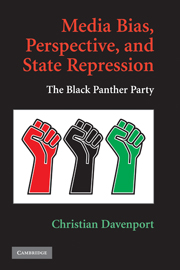Preface and Acknowledgments
Published online by Cambridge University Press: 05 June 2012
Summary
Geoffrey Hawthorn once stated (1991: xi) that “possibilities haunt the human sciences.” Although the phrase refers to counterfactuals, it has stuck with me because at the time I came across it, I was just beginning to investigate a rather complex research problem. In 1994, when I started what would become this project, I was interested in understanding why and how repressive behavior was directed against the Black Panther Party (BPP) in Oakland, California, between the years 1967 (the first full year of their existence) and 1973 (the ending for the first and most well-known cohort of members). Simply put, I was interested in understanding why and how the Bay Area Panthers were harassed, beaten up, wiretapped, arrested, shot, and tried by authorities throughout the United States. Although opinion on this matter remains bitterly divided to this day, systematic investigation of the topic is not to be found.
As for an explanation for the organization's demise, there is plenty of blame to go around. Some, for example, point to the BPP themselves for the repression directed against them because of their rampant criminality, violence, and radicalism. Others place the blame squarely on the shoulders of political authorities because of their pervasive racism and the extensive use of violence against African American social movements, in particular, as well as against blacks in general. Still others blame both the Panthers and the police for what took place, noting that the combination of the two created and perpetuated a situation that led to political repression.
- Type
- Chapter
- Information
- Media Bias, Perspective, and State RepressionThe Black Panther Party, pp. xi - xviPublisher: Cambridge University PressPrint publication year: 2009



